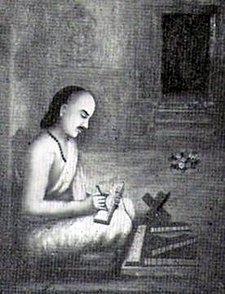This article includes a list of general references, but it lacks sufficient corresponding inline citations. (February 2008) |
Kumara Vyasa | |
|---|---|
 | |
| Born | |
| Died | 1446 |
| Occupation | poet |
Narayanappa (Kannada: ನಾರಾಯಣಪ್ಪ), known by his pen name Kumara Vyasa (Kannada: ಕುಮಾರವ್ಯಾಸ), was an influential and classical poet of early 15th century in the Kannada language. His pen name is a tribute to his magnum opus, a rendering of the Mahabharata in Kannada.[1] Kumara Vyasa literally means "Little Vyasa" or "Son of Vyasa" (Vyasa is the title of Krishna Dwaipayana, the author of Mahabharata). He was the contemporary and archrival of the famous Veerashaiva poet laureate Chamarasa who wrote the seminal work Prabhulingaleele covering the lives of Allama Prabhu and other Shiva Sharanas, circa 1435. Both poets worked in the court of Deva Raya II.[2]
- ^ Vishwa Adluri; Joydeep Bagchee (27 July 2011). When the Goddess was a Woman: Mahābhārata Ethinographies - Essays by Alf Hiltebeitel, Volume 2. BRILL. p. 3. ISBN 9789004216228. Retrieved 27 July 2011.
- ^ C. T. M. Kotraiah; K. M. Suresh (2008). Archaeology of Hampi-Vijayanagara. Bharatiya Kala Prakashan. p. 390. ISBN 9788180902116. Retrieved 1 January 2008.